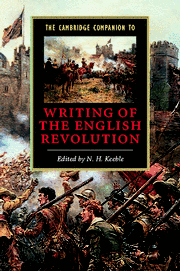13 - The English Revolution and English historiography
from Part 5 - Rethinking the war
Published online by Cambridge University Press: 28 May 2006
Summary
Traditions in historiography
The early modern period, it has been claimed, saw a 'historical revolution'. Just how far that term is appropriate, both for the writing of history and for the events of the mid-century themselves, has been much disputed. What is clear is that the political upheavals of our period provoked a wave of remarkable and original writing, stimulated by the authors' sense that they had helped to shape the events they were describing.
>From the start of the Renaissance in Europe, humanist scholars with an impassioned commitment to reviving Classical learning had paid particular attention to history-writing. In the Greek writers Polybius and Thucydides, the Romans Livy and Sallust, they found an intellectual coherence and stylistic vividness that they felt to be lacking in the medieval year-by-year chronicles of secular or religious history. They wanted to go beyond the bare facts to the human passions and motivations that had informed them and the underlying causes. Humanist histories like Sir Thomas More’s History of Richard III (1543) and George Buchanan’s History of Scotland (1582) might go well beyond their sources to imagine how the leading agents might have spoken and acted, blurring the boundaries between history and fiction: what counted was the general insight into human behaviour that a particular story could convey. This more ‘literary’ approach was complemented by an emerging school of antiquarian historians such as John Leland (c. 1503–52) and Sir William Dugdale (1605–86) who devoted themselves to broadening the evidential base of history by compiling manuscript and printed evidence. The great Tudor compilations of chronicles by Edward Hall (1548) and Raphael Holinshed (1577) eclectically brought together passages from humanists like More and Buchanan and a huge range of texts and documents, providing a great diversity of approaches to history to a growing reading public.
- Type
- Chapter
- Information
- The Cambridge Companion to Writing of the English Revolution , pp. 233 - 250Publisher: Cambridge University PressPrint publication year: 2001
- 1
- Cited by



